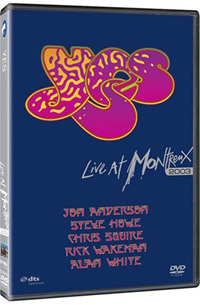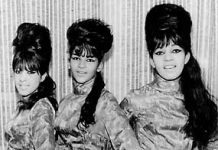In 1977, Yes welcomed keyboardist Rick Wakeman back into the fold and recorded their magnificent eighth studio album Going For The One in Montreux, Switzerland. Oddly enough, they didn’t play the city’s world-famous jazz festival until 2003, a year after Wakeman rejoined Yes for fourth or fifth time, depending on who you ask. Either way, the classic line-up (which also includes Jon Anderson, Chris Squire, Steve Howe, and Alan White) won the festival’s spectators over with a cosmological performance that has finally found its way to DVD with the apt title of Live At Montreux 2003.
Just as the same musicians did on Yessongs back in 1973, the band opens the show with “Siberian Khatru,” thrusting the reunited quintet into the stratagem of assessment. Howe’s meticulous picking style is unscathed; Wakeman’s command of the rows of keys surrounding him remains undiminished. Conventional wisdom says if they can pull this one off, they’re more than ready for the rest of the repertoire. Yet, the most challenging material doesn’t come until later in the program.
“Magnification” and “In The Presence Of” from Magnification, the most recent Yes studio album from 2001, blend in swiftly with “Don’t Kill The Whale,” before the players reach deep into their fun bag and pull out a cult favorite from Fragile: “South Side Of The Sky.” For this rocking chestnut, the fluttering harmonies are sustained by shots of scratchy guitar work and a square and burly rhythm laid down by Squire and White. Longtime fans are said to have developed huge lumps in their throats because of this number. Proggies are truly the most sentimental fans in the world.
From “And You And I” to “Heart Of The Sunrise,” the machine torques its muscles and dutifully replicates its parts to perfection. Naturally, Howe cops a few whistles with his acoustic ditty, “Clap,” while Wakeman effortlessly solos through excerpts of his hefty catalog. Squire, keen to show the youngsters how to properly explore every possible maneuver on the bass guitar, grabs some serious sunshine during “The Fish.” White, for his part, takes no substantial solo of his own, perhaps comfortable in the knowledge that keeping up with the likes of Howe, Wakeman, and Squire could almost be construed as a form of soloing in itself.
For all the electricity in the air, it is Anderson’s spiritually ambiguous lyrics that give the music of Yes its surreal quality. The heavens open amongst the intricate chemistry of the magnum opus, “Awaken.” Here is where all the elements collide in one hopeful prayer, woven together by layers of dissonant notes, suddenly uplifted by the chorus, then catapulted into a dizzying foray of tempo changes, key alterations, and twirling annotations. Once “I’ve Seen All Good People” And “Roundabout” seal the reel, so to speak, it’s time to tuck the little ones in, hoping they too will dream about a reawakening in 2008 to celebrate 40 years of Yes music.
~ Shawn Perry




















